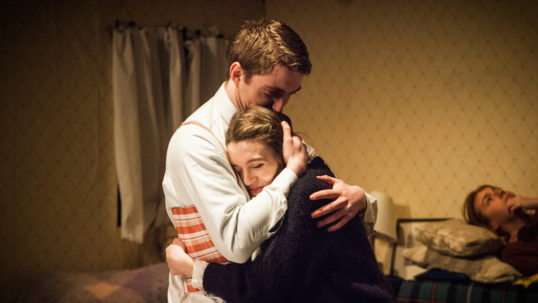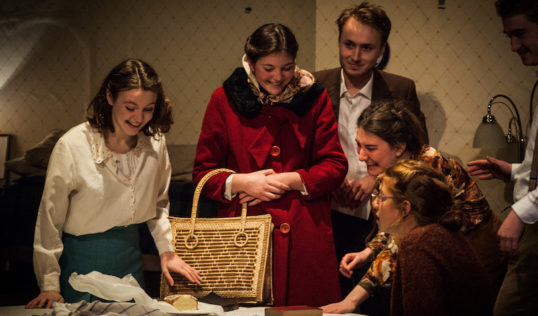The Diary of Anne Frank
★★★★☆ All too real
Bedlam Theatre: Tue 7 – Sat 11 Feb 2017
Review by Hugh Simpson
Well performed, well directed and extremely affecting, EUTC’s Diary of Anne Frank at the Bedlam is a thoroughly timely production.
Anne Frank’s posthumously published Diary of a Young Girl is presented here in its adaptation by Wendy Kesselman from Frances Goodrich and Albert Hackett’s earlier stage version. The story of how Anne, her family and others hid from Nazi persecution in an attic annexe above her father’s former place of business in occupied Amsterdam is well known from a variety of adaptations.

George Prove, Alice Markey, Peter Morrison and Bradley Butler in the Diary of Anne Frank. Photo EUTC
One of the reasons why the story resonates is because of its portrayal of people attempting to carry on ordinary life under extraordinary circumstances, and this production scores highly here, with a confident, accomplished feel to the whole thing. Director Marian Bretagne makes good use of a well-designed set with discrete acting areas, while there is a great deal of clever business involving performers who are not speaking; one sequence showing the passage of time in the annexe is particularly effective.
This expansiveness does have a couple of drawbacks. The acting space is so well used it makes the hideout seem less claustrophobic than it surely was. The constant movement of characters not directly involved in a scene can be off-putting; one pivotal, touching scene between Anne and the shy teenage boy Peter is overshadowed by a convincing and somewhat over-demonstrative card game taking place in front of them.
It also draws attention to the one real criticism of the performances in what is a notably well acted piece. Some of the cast inhabit their roles completely; others are not quite as comfortable, particularly when they are not directly involved in dialogue. This is crystallised by the two outsiders who are aware of the hiding place – Elizabeth Prideaux is totally credible as Miep Gies, while Isaac Allen is much less at ease as Mr Kraler.
humour and desperation
Peter Morrison’s Mr Frank has a stoical yet kindly air, in a measured performance that has genuine weight. He only falls down a little in an epilogue of tragic, terrifying proportions that is almost impossible to perform. Katrina Woolley and Bradley Butler, as the van Daans, combine humour and desperation extremely well, with Woolley in particular cutting a believably heartbreaking figure. George Prove, as Anne’s reluctant room-mate Mr Dussel, also switches from humour to pathos with enviable ease.
Billy Slater is every inch the diffident teenager as Peter, while Molly Griffiths (Anne’s sister Margot) brings a frighteningly sullen fear to the role.
Alice Markey achieves a numbly brittle incomprehension as Mrs Frank, the mother who is the source of Anne’s resentment. Other performers occasionally betray that they are playing someone of a different age, but this is an entirely convincing and quietly moving portrayal.
The best thing about the production, however, is Lucy Davidson as Anne. One of the reasons her diary has taken on such symbolic importance is that she comes across like so many teenagers. She may have been a talented writer, but she is also wilful, capricious, prone to mood swings, irritating, thoroughly good-hearted, and boundlessly optimistic and resilient. Davidson epitomises all of this and more besides.
The fact that we already know what is going to happen makes it even more important that we identify with her, and it is impossible to do otherwise in the face of such a complex and realistic representation. There is the odd moment where she seems in danger of overdoing the comedy, but she always rows back at exactly the right time, showing us that it is the character who is performing, not her.
odd staging choices
There are other odd staging choices besides those already mentioned. The time-honoured problem of real food on stage causes a couple of problems – not least the fact that so much of it goes uneaten after we have been told they are starving. There is also the odd sightline problem that exacerbates some of the issues of performers being obscured. This affects a couple of cues with effective but occasionally over-fussy lighting; the significance of one (somewhat portentously literal) effect right at the end is lost on the front half of the audience.
It is the end of the play that causes the most problems. When the terrible events that we all know are coming do happen, the arrival of three rather sheepish-looking Nazis fails to persuade. This may be a representation of the banality of evil – and current opinion is that the Franks’ discovery may have been an accident, rather than the result of a betrayal – but either way, it doesn’t work.
This is of little importance in the light of what has gone before. Another Anne Frank will be appearing on the Edinburgh stage this year, and the reasons for this are not hard to find. With the rise in scapegoating of anyone different, the continued comeback of fascism and the ‘alternative facts’ brigade who have some horrifying allies, this seems more real than at any time recently – just try typing the words ‘did the’ into Google and see how it autocompletes it. This production is utterly human and utterly necessary.
Running time 2 hours (no interval)
Bedlam Theatre, 11 Bristo Place,, EH1 1EZ
Tuesday 7 – Saturday 11 February 2017
Daily at 7.30 pm
Full details and tickets on the Bedlam website: https://www.bedlamtheatre.co.uk/shows/the-diary-of-anne-frank
ENDS




















